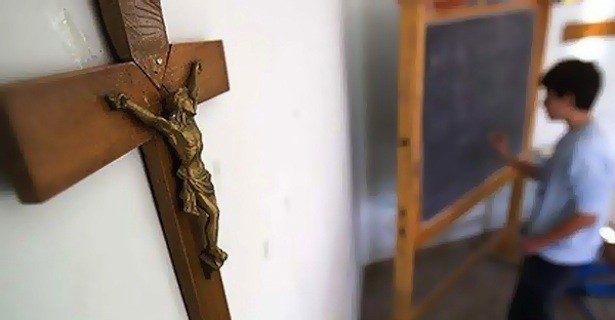Nothing has had a more formative influence upon Ireland and Europe than Christianity, writes David Quinn
State-run secondary schools are set to end a policy of Christian-only symbols on their walls, put the celebrations of other religions on a par with Christian celebrations such as Christmas, and end compulsory attendance at school Masses.
The news made me immediately think of the ruling by the European Court of Human Rights (ECHR) in the Lautsi case.
Mrs Lautsi was a Finnish-born lady living in Italy. She objected to the fact that in Italian state-run schools, the crucifix is on display. She said that this violated the right of her child not to be “indoctrinated” in a given religion.
The court initially ruled in her favour, but then it was overturned, and it was decided crucifixes could remain in place.
The initial ruling had caused uproar across Europe. Political parties across the left-right divide in Italy objected to the decision, and countries as diverse as Armenia, Bulgaria, Cyprus, Greece, Lithuania, Malta, the Russian Federation and San Marino joined Italy in its appeal.
Decision
When the original decision in favour of Mrs Lautsi was announced in 2009, Italy’s then Education Minister, Mariastella Gelmini, said crucifixes on the walls of tens of thousands of classrooms “do not mean adherence to Catholicism” but are a symbol of Italy’s heritage.
“The history of Italy is marked by symbols and if we erase symbols we erase part of ourselves,” she added.
Paola Binetti, a member of opposition Democratic Party, the successor of what was once the West’s largest communist party, said: “In Italy, the crucifix is a specific sign of our tradition.”
Foreign Minister Franco Frattini said the court had dealt a “mortal blow to a Europe of values and rights”.
A 14-year-old Muslim schoolgirl, quoted by Reuters, said: “If the crucifix is there and I am a Muslim I will continue to respect my religion. Jesus in the classroom doesn’t bother me.”
Upon appeal, the original ruling was overturned. The court decided that the presence of the crucifix was not a form of indoctrination. It said: “A crucifix on a wall is an essentially passive symbol and…cannot be deemed to have an influence on pupils comparable to that of didactic speech or participation in religious activities.”
The whole debate about the Lautsi case turned on how a Christian-heritage country should accommodate itself to newcomers and also to nationals who are now secular-minded and in some cases hostile to religion and especially to Christianity.
Should the crucifix be removed from everything that is run by the State?”
Is the state still allowed to acknowledge its historical roots, including its religious ones? This was at the heart of the remarks by the Italian Education Minister that the history of her country is “marked by symbols and if we erase symbols we erase part of ourselves”.
The same is true of every country, including Ireland. Nothing has had a more formative influence upon Ireland and Europe than Christianity. Even in our secularism, we are Christian. Almost all moral arguments are still based on the core Christian idea that we are created equal in dignity and worth. You will find very few secularists who do not believe this, even when they deny the existence of God.
The crucifix is the preeminent symbol of our Christian heritage. Should it now be removed from everything that is run by the State?
This certainly seems to be the thinking behind the decision to greatly deemphasise the place of Christianity in our 200 State-run secondary schools.
Proponents of the new policy will defend it in the name of ‘tolerance’ and ‘diversity’ and will say it reflects a changing Ireland.
But this simply returns us to the original question: to what extent should we deny our roots in order to accommodate our new reality?
Can we not accept that we are more multi-cultural, more secular and that we are a Christian-heritage country?
Symbols
Adding symbols of all the religions of all pupils to the walls does recognise diversity, but it can also teach children a type of religious relativism or indifferentism. How many Muslim parents (say) are truly happy about that? And why are so many Muslims parents happy to send their children to Catholic schools in Ireland, Britain and elsewhere?
How many Muslim parents are genuinely unhappy that a school, even a state-run one in a Christian heritage country like Ireland marks Christmas to the extent it does?
If we were in a Muslim country wouldn’t we expect its schools to celebrate the Muslim festival of Eid far more than Christmas, if they mentioned Christmas at all?
Wouldn’t we expect a Muslim country to reflect the fact that it is Muslim, while hopefully respecting other religions also?
As usual, it is a question of getting the balance right. What recognition will schools in the future give to our Christian heritage?
Graduation Masses
Ending mandatory graduation Masses in State-run multi-denominational schools makes sense, but downgrading Christmas does not. It is disproportionate. It does not recognise the deep Christian roots of this country. It begins to erase our identity, as does relegating the crucifix to a minor place in schools, if it has a place at all.
When the original Lautsi decision was appealed, the appellant countries were represented by Prof. Joseph Weiler, a Jewish legal expert.
It is interesting in itself that a member of the Jewish religion would defend the right of European countries to display the crucifix on the walls of State-run schools.
When the court overturned its original ruling, Prof. Weiler said it was “a rejection of a ‘one-size-fits-all’ Europe”, meaning one that has to be secular.
A country that respects all faiths is one thing, but it is quite another to deny your own identity in doing so, and that appears to be where Ireland is headed.


 David Quinn
David Quinn
